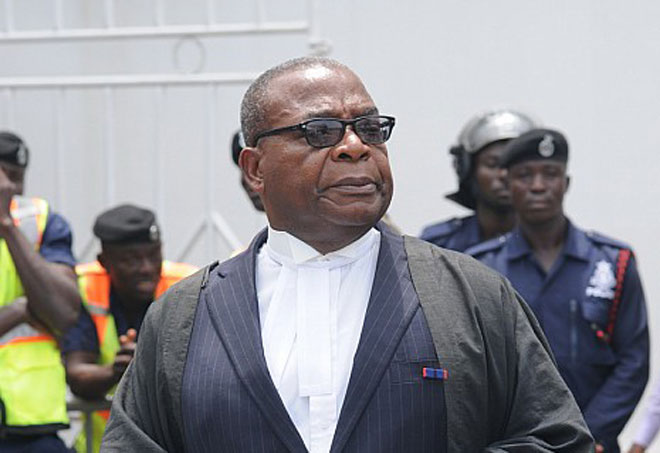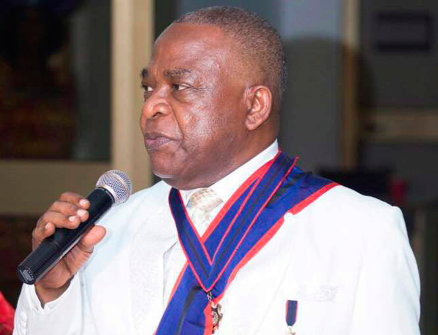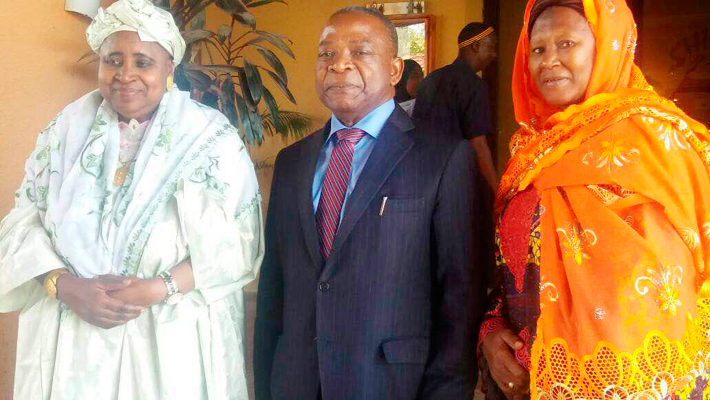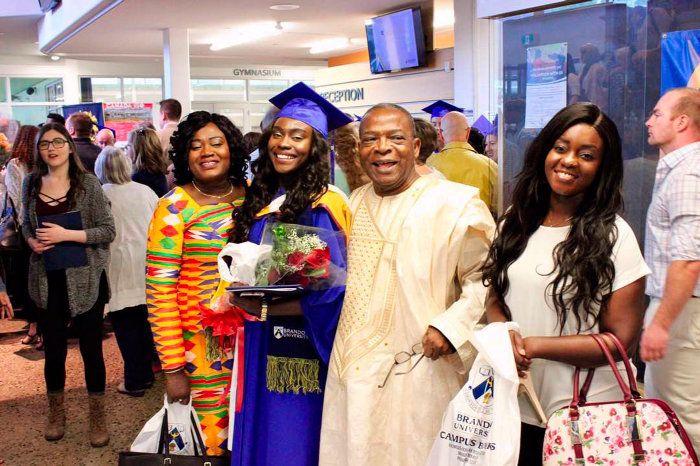
Nana Ato Dadzie takes peace building, political transitions to different level
Naturally, nobody likes war. Wars have had devastating effects on society from the dawn of human history.
Hundreds of millions of people have lost their lives due to it and generations after generations have suffered the psychological effects that wars have heaped on their nations and families.
It is for this reason that peace is paramount to the development of every nation. Delivering a paper at the annual Nelson Mandela international roundtable on political development in Africa, Nana Ato Dadzie, who is a former Chief of Staff under the government of the National Democratic Congress (NDC) led by former President Jerry John Rawlings, prevailed on African countries to establish clear regulations and administrative structures to ensure peaceful transfer of power all the time.
The public lecture, which was held last Thursday in Abuja, was on the theme: ‘African Democracy: Presidential Emergence Pattern, Political Conflicts and Peace-Building Options.’
Advertisement
The lecture was attended by dignitaries, including the Executive Governor of the Bauchi State, Muhammad Abubakar; the South African High Commissioner to Nigeria, Lulu Louis Mnguni; the ECOWAS Commissioner for Political Affairs, Peace and Security, Halima Ahmed; and the Deputy Minority Whip of Nigeria Senate; Biodum Loujimi.
Nana Dadzie, however, said some African countries lacked the experience to deal effectively with transition processes as studies had shown that “not less than 60 per cent of post-electoral crises are transition-based”.
Referring to instances of post-election violence in some African countries, he underscored the need for leaders to adopt a more peaceful approach to democratic transitions. "The stability of the democratic order requires the creation of bi-partisan committees, structures, rules and procedures that will regulate the transition of government power and administration from one set of government to another," he stressed.
According to Nana Dadzie, all over Africa, there was great attention and investment in the electoral process but unfortunately, little attention was paid to the transition process.

Nana Dadzie’s peace-building options
Sharing some experiences and thoughts on how power was handed over in some African countries, including Ghana, he said Ghana’s 2001 post-election transition from the government of former President Flt Lt (retd) Jerry John Rawlings to that of Mr John Agyekum Kufuor was divisive and damaging to the country’s administration.
The handover of 2001, however, was characterised by acrimony, with the outgoing government yet to come to terms with its defeat in the election and the incoming gloating over its victory and at the same time making demands over where vehicles and other state assets were.
He added that the “winner-takes-all” type of multi-party politics in the country fuelled the humiliation of the losers of elections and the exuberant attitude of the victors. After the 2009 election, when the new government came into power, the transition was handled more efficiently, there was a much greater continuity of policy and it was a significant step in the nation’s democracy.
The legislation was eventually passed into law as the Presidential (Transition) Act, 2012 (Act 845) in time for the 2012 election and the subsequent handover of power. “President Mahama duly followed the provisions of the law and appointed a Transition Team after he was declared President-elect.”
The Gambia story
Nana Dadzie, who played a significant role in The Gambia transition, said what happened at The Gambia for instance reflected a typical case of failure of a transition process. Having unconditionally accepted defeat at the December 1, 2016 presidential polls on December 2, 2016, the next constitutional step for ex-President Jammeh was the transfer of power to the winner, Mr Adama Barrow.
However, the big question was, what went wrong? He explained that records indicated that both the incoming and exiting Presidents set up parallel transition teams to facilitate the transfer of power. While in The Gambia, Nana Dadzie and his team helped to identify the bottlenecks to a smooth transition and also helped to salvage the botched transitional process and put it back on track.
Touching on the challenges of interacting with new and former administrators, he stressed it was a basket full. “Transitions are generally bridges which normally come into being between election and assumption of office by the new President. In The Gambia, we came in when the tenure of the previous President had run out. After the new President had assumed office, the former President had, in fact, moved into exile and was out of the jurisdiction.
Unavailable to properly hand over, his government had indeed collapsed through resignations, dismissals and abandonment even before he left the jurisdiction,” he added.
The Gambian condition was a challenging task because, there was no president to hand over to the new president and there were no ministers and other key government appointees to hand over either in fact many of whom had flee the country nonetheless, we muddled through employing a mixture of diplomatic tools and skills to get the situation normalised.
Before the Gambia call, the former chief of staff (presidency), Republic of Ghana, (1997) who superintended and successfully handed over physical assets of state to incoming NPP government 2001in Ghana also assisted the smooth transition between Jonathan and Buhari in Nigeria, as a consultant to the National Democratic Institute (NDI), Washington, USA (2015-2017) called the mission Nigeria
Before then, this proud son of Ghana was a member of the IEA team to Republic of Sierra Leone to assist cool down political tempers after first democratic election in 2007.

Role of an expert in political transition
Throwing light on who was an expert in political transition, Nana Dadzie said the person assists and facilitates a country in delivering a peaceful and orderly transfer of political power from one democratically elected President or government to another.
“Records of post-electoral violence in Africa tend to indicate that majority revolve around transition issues arising from absence, novelty, paucity of administrative, institutional and legal framework for managing transition,” he noted.
He further added that the expert’s work was to assist to identify, classify and make recommendations to the appropriate authorities to remedy the weaknesses so established to ensure that the present and future transitions are better managed.
Nana Dadzies, who is highly regarded by the United Nations as one of the best brains in democratic transitions indicated that transition by its very nature does not just happen but a process which it starts long before elections are held and continues through to the next one.
He is currently the UNDP/ Independent Transition Planning Expert (ITPE) in Liberia, towards the impending elections October 2017. It is expected that Nana Dadzie will assist that country navigate through it transitional process.
“Africa is once again praying and hopping that the National Election Commission of Liberia, conduct a free, fair and transparent election come October, when the presidential and Representative Elections are held. President Sirleaf Johnson who is exiting the presidency has said that the October 10, 2017 elections are a defining moment for Liberia because the elections will determine whether or not the country goes forward, and promote its democracy or if Liberia moves backward”.
Transitions in Africa
“Beginning from a democratic high hope and ‘wind of change’ after the colonial past, the African continent was soon to be dominated by strong dictators and wrecked by military coups, insurgencies and one–party states. There were no transitions. There were simply takeovers from Algeria in the North to Zimbabwe in the South; Sudan/Somalia in the East and to Ghana in the West; one party dominated the political space.”
Explaining factors causing these dramatic changes in Africa, he said other developed countries such as UK, USA, France, Canada, Australia, Italy, Ukraine among others saw new Presidents emerging, hence the wind of change everywhere.
This is simply people’s power and power of the ballot box and the increasing transparent electoral process. “Africa has received greater attention and investment from international stakeholders in support of the electoral systems, procedures and processes which have also had a deep influence on the inclusivity and transparency of the system, leading to greater ready acceptance of the ultimate electoral result,” he stated.

Who is Nana Ato Dadzie?
It looks like beyond his popularity as a former Chief of Staff and a legal luminary, many are those who are not aware that Nana Dadzie is a man with many parts. He is currently travelling around the globe for peace building and political transitions. He is a consultant to the National Democratic Institute (NDI) and a chief in his hometown.
Currently, when it comes to issues on political transitions within the sub-region, Nana Dadzie seems to be on top. He is also a UN senior consultant on political transition at The Gambia. Nana Dadzie was appointed by the UN to facilitate the transfer of political power from the government of ex-President Yahaya Jammeh to that of incoming President Adama Barrow (January to April 2017).
He was equally the PNDC Secretary and Presidential Advisor with Cabinet status from 1983-1997. He was called to the Bar in 1975 together with other great legal brains such as President Nana Addo Dankwa Akufo-Addo and Mr Tsatsu Tsikata.
Nana Dadzie comes from Gomoa Ankamu in the Central Region and he is a Divisional Chief (Apagyahene) of the Gomoa Ajumako Traditional Area. Nana Dadzie unfortunately lost his first wife, Mrs Abena Fosuaa Dadzie, and remarried Matilda Otiwaa Dadzie. He has three biological children and a stepdaughter.
Nana Dadzie had his secondary education at the Adisadel College in Cape Coast from 1963 to 1968. He left for the Sekondi College in the Western Region for the Advanced Level from 1968 to 1970.
When Nana Dadzie is not resolving political conflicts or seeing to peaceful transitions, he loves to play football or watch wrestling. He also loves debating, reading, writing and also cooking for his family and friends.
